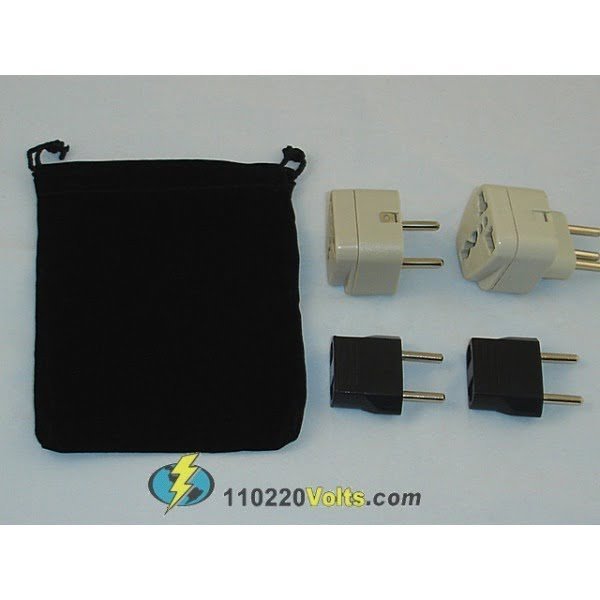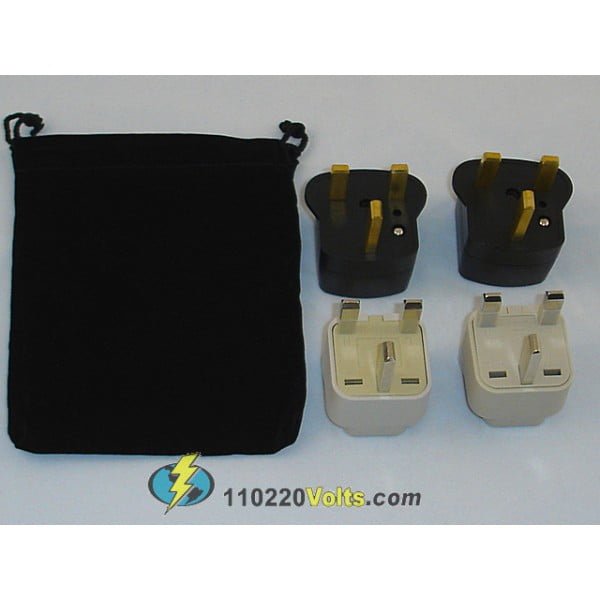Rwanda Power Plug Adapters Kit with Travel Carrying Pouch – RW
- Rwanda Plug Adapters Kit with Travel Carrying Pouch Includes:
- One Wonpro Grounded plug adapter for Rwanda
- One Wonpro Non-Grounded plug adapter for Rwanda
- One Basic Grounded plug adapter for Rwanda (other outlet configuration if needed)
- One Basic Non-Grounded plug adapter for Rwanda (other outlet configuration if needed)
- One Black Travel Velvet Carrying Pouch
$32.99 Original price was: $32.99.$11.90Current price is: $11.90.
SKU: Rwanda-Plug-Adapter-Kit
Category: Worldwide Travel Plug Adapter Kit with Carrying Pouch
Tag: rwanda
Rwanda Plug Adapters Kit with Travel Carrying Pouch Includes:
- One Wonpro Grounded plug adapter for Rwanda
- One Wonpro Non-Grounded plug adapter for Rwanda
- One Basic Grounded plug adapter for Rwanda (other outlet configuration if needed)
- One Basic Non-Grounded plug adapter for Rwanda (other outlet configuration if needed)
- One Black Travel Velvet Carrying Pouch with Drawstring closure Large 4 wide x 5 inches
Rwanda Electrical Outlet Type - Rwanda uses Type C andType J
- Type C, Countries Using Type C Plug

- Type J, Countries Using Type J Plug

| Weight | 0.4000 lbs |
|---|---|
| Color Travel Pouch | BLACK (If Available) |
Information
- Outlet Plug: Virgin Islands uses
Type A
- and
Type B
Voltage and Video
Rwanda Voltage and Video Systems
Rwanda Voltage and Frequency
- Electricity in Rwanda is 230 Volts, alternating at 50 Hz (cycles per second)
- If you travel to Rwanda with a device that does not accept 230 Volts at 50 Hertz, you will need a voltage converter
Rwanda Video System
- Rwanda has D.K/PAL, SECAM video system
History
Rwanda History
- In 1959, three years before independence from Belgium, the majority ethnic group, the Hutus, overthrew the ruling Tutsi king. Over the next several years, thousands of Tutsis were killed, and some 150,000 driven into exile in neighboring countries. The children of these exiles later formed a rebel group, the Rwandan Patriotic Front (RPF), and began a civil war in 1990. The war, along with several political and economic upheavals, exacerbated ethnic tensions, culminating in April 1994 in the genocide of roughly 800,000 Tutsis and moderate Hutus. The Tutsi rebels defeated the Hutu regime and ended the killing in July 1994, but approximately 2 million Hutu refugees – many fearing Tutsi retribution – fled to neighboring Burundi, Tanzania, Uganda, and Zaire. Since then, most of the refugees have returned to Rwanda, but several thousand remained in the neighboring Democratic Republic of the Congo (DRC; the former Zaire) and formed an extremist insurgency bent on retaking Rwanda, much as the RPF tried in 1990. Despite substantial international assistance and political reforms – including Rwandas first local elections in March 1999 and its first post-genocide presidential and legislative elections in August and September 2003 – the country continues to struggle to boost investment and agricultural output, and ethnic reconciliation is complicated by the real and perceived Tutsi political dominance. Kigalis increasing centralization and intolerance of dissent, the nagging Hutu extremist insurgency across the border, and Rwandan involvement in two wars in recent years in the neighboring DRC continue to hinder Rwandas efforts to escape its bloody legacy.
















Reviews
There are no reviews yet.